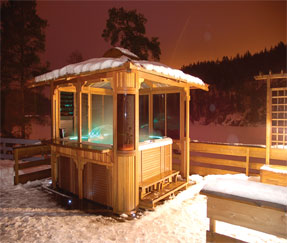Soaking in a hot tub can bring many health benefits. In fact, the word "spa" is an acronym for the Latin “salus per aquam”, which literally means "health from water." Ancient cultures - including the Egyptians, Greeks, and Romans - used spas for therapy and relaxation. The Mohawk tribe in New York named their local hot spring "Sarasota" - which means "place of miraculous water in rock." In more recent times, natural hot springs around the country were a popular vacation destination for those who could afford the indulgence.
Spas and hot tubs have changed dramatically since the days of soaking in natural mineral spas - but the reasons they feel just as good today remain the same. There are three simple principles that affect the body.


HEAT
Everyone knows that a hot tub is hot - it's right there in the name! But not everyone knows of the great benefits to the body when you spend a few minutes in your spa.
When your body absorbs heat, several subtle physiological processes occur. First, as your body warms up, blood flow is increased. The warming of your blood causes your blood vessels to dilate. Blood pressure is subsequently reduced - often in as little as 20 minutes.
Additionally, the hot water also causes muscle relaxation as heat from the water is carried deep into your muscles. Normally, your body tries to cool itself by carrying heat to the surface via your blood. Unlike a bathtub, a spa can maintain a hot water temperature indefinitely. So while you are soaking in a spa, your blood doesn't recirculate at a reduced temperature. It returns deep within your body at a warmer temperature than before, delivering therapeutic heat where other treatments cannot.
Furthermore, the central nervous system's sensitivity it muted, as your body focuses its attention on the heat gain. This brings about temporary pain relief. This neurological affect can happen with any gradual increase or decrease in your body's temperature - but soaking in warm water sure sounds nicer than the alternative!

BUOYANCY
Even the fittest among us has a lot of weight on our joints. Think of your feet and ankles - they support almost all of your body's weight - every day, all day long. Other joints are constantly in motion - your knees, elbows, and wrists, for example. And unfortunately, everyone either has experienced some sort of back pain, or knows someone who has.
When we are sitting in a spa, the natural buoyancy of the water supports approximately 90% of our weight. This obviously reduces the strain on our joints, by giving them a little "down time" from the daily grind. Pressure is greatly reduced on all of your joints and muscles while your are relaxing in your hot tub.
HYDROTHERAPY
Anyone who has used a spa before is familiar with the relaxing affect of the jets themselves, and their obvious benefits. Focused streams of water - with warmed air mixed within the flow - can provide a therapeutic massage that you can control, depending on how gentle or intense you want it to feel.
Hot tubs are equipped with nozzles of various sizes, pressures, configurations, and quantities - all designed to target particular portions of your body. Smaller groups of jets will hit pinpoint muscles around your neck. Many jets will focus on certain portions of your back. Larger flow jets will actually sweep up and down your entire back, just to the sides of your spine. Tiny jets will spin around your wrists. Other jets will aim for your calves, feet, or arms. Like a trained masseuse, the spa's jets can soothe sore muscles any time you need.
MEDICAL BENEFITS
Owning and using your spa can have a more lasting effect on your health. There are many studies that demonstrate the benefits.
BACK PAIN
"This controlled clinical trial shows a positive short term and a more moderate long-term overall effectiveness of spa therapy in chronic lower back pain." Participants in the study who utilized spa treatments experienced increased back flexibility, reduced pain duration, and lessened use of analgesics and anti-inflammatory drugs than the study group that did not receive spa treatments.
- British Journal of Rheumatology, 1994
WEIGHT LOSS AND DIABETES
Patients with Type 2 Diabetes Mellitus were studied using a hot tub 30 minutes a day, 6 days per week. After only 10 days, patients required reduced doses of insulin, lost weight, showed distinct decreases in plasma glucose and glycosylated hemoglobin, and benefited from improved sleep and an increased general sense of well-being.
- New England Journal of Medicine (08-16-1999)
ARTHRITIS
"People whose arthritis symptoms respond well to heat have discovered the many benefits of heat therapy."
- Arthritis Foundation: Arthritis - Spas & Warm Water Exercise
"Regular sessions in your hot tub help keep joints moving. It restores and preserves strength and flexibility, and also protects your joints from further damage. Exercise can also improve a person's coordination, endurance, and the ability to perform daily tasks, and can lead to an enhanced sense of self-esteem and accomplishment."
"A hot tub fulfills the need perfectly . . . providing the warmth, massage, and buoyancy that is so necessary to the well-being of arthritis sufferers. The buoyancy of the water supports and lessens stress on the joints and encourages freer movement. Water exercises may even act as a resistance to help build muscle strength."
- Arthritis Foundation: Spas, Pools, and Arthritis
CARDIOVASCULAR HEALTH
Soaking in a spa simulates exercise. It increases the heart rate, yet it doesn't increase blood pressure. In fact, study participants who relaxed in spas had a decrease in blood pressure, while participants who exercised on bicycles experienced in increase in blood pressure. The regular use of spas and hot tubs gives you some of the same health benefits of exercise but with less heart stress.
- Mayo Clinic: Mayo Clinic Ok's Spas for Heart Patients
IMPROVED SLEEP
Some studies suggest that soaking in hot water (such as a hot tub or spa) before retiring to bed can ease the transition into deeper sleep.
- National Sleep Foundation
Your body can be eased into a state of deep and relaxing sleep by a drop in body temperature after going to bed. Soaking in hot water about 90 minutes before bedtime triggers your internal thermostat to lower your temperature, thus inducing sleep to set in more easily.
- Associated Professional Sleep Societies Journal "Sleep"











